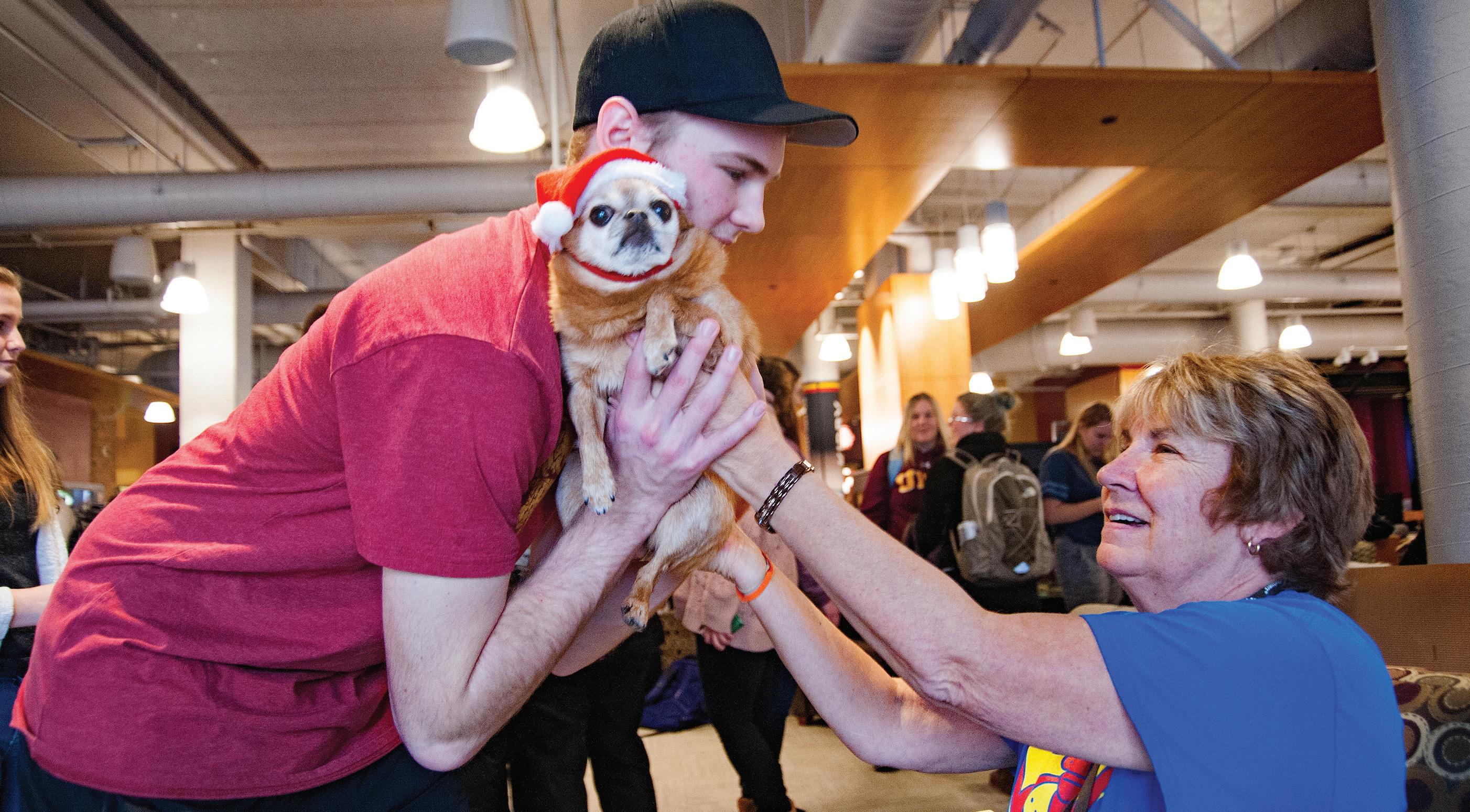
4 minute read
Understanding the difference
Service, therapy and emotional support animals
by K a SH a STOLL PHOTOS by DaVID ba LL ar D PHOTOG ra PH y
The confusion is real, and Pat Castellano sees it all the time.
Many people don’t know the difference between service dogs and emotional support animals, said Castellano, who conducts education courses for Animal Allies and works as an evaluator for Pet Partners, an animal therapy organization.

That confusion has created problems for people who rely on service animals and for business owners who comply with the Americans with Disabilities Act but choose to restrict other animals from their stores. It has also led to legislation.
Definitions
A service animal is most often a dog that has been individually trained to do work or perform tasks for a person with a disability. Examples of the tasks performed include, but are not limited to: guiding a blind person, alerting a deaf person, pulling a wheelchair, and calming a person with Post Traumatic Stress Disorder during an anxiety attack.
Dogs receive extensive training to learn how to stay focused, remain calm and perform specific tasks. It costs more than $25,000 to train and place an assistance dog, according to Can Do Canines, an organization that serves people in Minnesota and Wisconsin. Can Do Canines is an accredited member of Assistance Dogs International.
“To have a service animal, a person must be so impaired as to have a disability,” Castellano said. “For example, needing glasses for poor vision is an impairment, but being unable to see with or without glasses is a disability.”
Service dogs are considered working animals and not pets. The Americans with Disabilities Act enables service animals to accompany people with disabilities into all areas of a business where the general public is allowed.
Therapy animals have been trained to provide comfort and affection to people. They often interact with people at hospitals, retirement homes and schools. However, unlike service animals, they are not allowed to enter businesses with a “no pets” policy unless they have been specifically invited.
Essentia Health has had a therapy dog program since February 1992. All their therapy dogs have been trained and are certified through Therapy Dog International.
Janelle Fresvik, rehabilitation services manager at the Miller-Dwan Inpatient Rehabilitation Program, said therapy dogs can help people regain strength and abilities that were lost due to an accident, injury or illness. She said simple tasks like petting, brushing or even talking to a dog can be beneficial.
“In the rehabilitation setting, benefits may include improved arm and hand function, improved balance, increased focus and attention, reduced anxiety, grief and depression, improved willingness and motivation to be involved in therapy, among many other things,” Fresvik said.
“Dogs are generally always happy to see you and tend to not care what we look like or talk like. For someone who may have a different/new body image to adjust to after an accident or injury, interacting with a loving, non-judgmental furry friend is very therapeutic.”
Essential Health also provides care and works with therapy dogs at Solvay Hospice House and Amberwing-Center for Youth & Family Well-Being.
“It has been amazing to see the comfort that Nova (a therapy dog) brings to patients at the end of life and to their families,” said Traci Marciniak, president of the MillerDwan Foundation. “She really does bring joy during a very stressful and difficult time.”
Nova is owned by and trained by Jack Lee.
The University of Minnesota in Duluth started a Pet Away Worry and Stress, or PAWS, program in 2011.

The event is offered once per month to provide stress relief for students, faculty and staff.
More than 2,000 people have participated so far this year, and more than 5,000 people participated during the 2017-18 school year, said Dori Decker, Wellness Coordinator for UMD Health Services.
Emotional support animals, or comfort animals, provide therapeutic support to a person with a diagnosed mental illness and must be prescribed by a mental health care professional. It can provide companionship and relieve loneliness, and may help with depression and anxiety.
Emotional support animals do not have special training, may or may not be tolerant of a wide variety of environments, and are not allowed in businesses with “no pets” policies.

Mary Valentine said she and her comfort dog Jack provide emotional support for each other. She has panic attacks and anxiety, and he was raised in a puppy mill.
“When my attention is focused on him, it takes away the (focus on) ‘me,’” she said. “There is something beside myself to concentrate on. I know he is there and will always be there for me. There is a heartfelt connection on both parts.”
In addition to being an emotional support dog for Valentine, Jack is also a certified therapy dog. The two of them often participate in the PAWS events at UMD. During a recent event, Valentine sat on a chair and watched as students held and petted Jack.
Even in that loud and crowded room, Valentine said Jack was giving her the emotional support she needs.
“I know he is looking for me, and I am looking for him,” she said. “We are still ‘touching.’”
Legislation
Effective Aug. 1, 2018, it is illegal in Minnesota to misrepresent a non-service animal as a service animal in order to attain rights or privileges granted under the Americans with Disabilities Act.
Anyone who says or acts like their pet or emotional support animal is a service animal in order to enter a business that prohibits pets will be guilty of a petty misdemeanor. If they do it again, they will be charged with a misdemeanor. — MDT
9th Annual Husband & Wife
Valentine Dinner Dance
Blackwoods Banquet Center - Proctor
Friday, February 15th, 2019 6:30-11:00pm
YPurchase tickets at FatherDaughterBallduluth.org

Y$70 per couple
YTickets available at Will-Call the night of the Event
YDinner choices:
• Char Grilled Top Sirloin
• Roasted Pork Tenderloin
• Broiled Walleye
• Roasted Vegetable Pasta
YDessert included - Wine & beer available for purchase. The evening will begin with an uplifting Christian message. Followed by a wonderful dinner and a night of dancing until 11:00pm.
The perfect evening for every couple!










